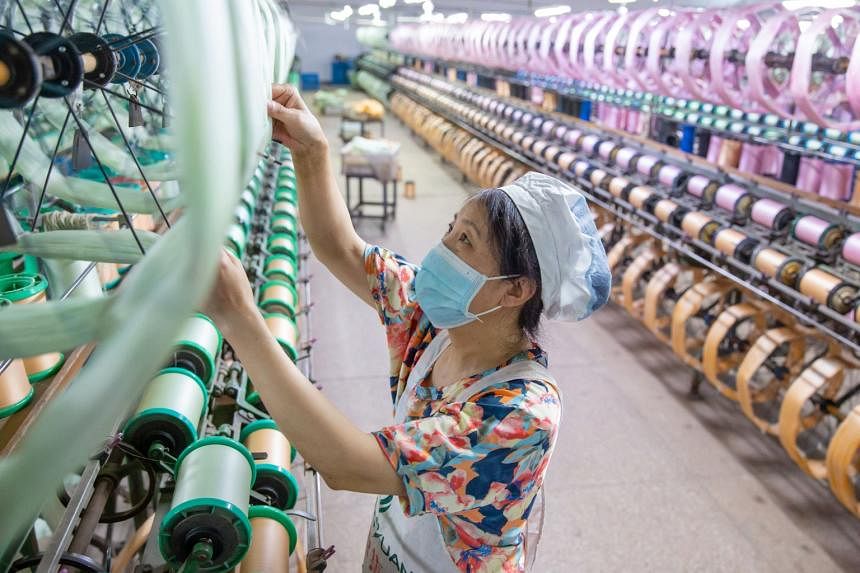BEIJING - China's economy recovered slightly last month from the fallout of tough Covid-19 restrictions, as the decline in consumer spending slowed and factories reported an increase in output.
Takings at the till in May fell 6.7 per cent from a year ago, a slight improvement from April's 11.1 per cent plunge - the steepest year-on-year drop since the early days of the pandemic in 2020.
Industrial output edged up 0.7 per cent last month from a year ago, coming back from the 2.9 per cent decline in April, the latest economic data from the National Bureau of Statistics (NBS) showed on Wednesday (June 15).
In May, the country's most prominent cities Beijing and Shanghai continued with drastic measures to curb Covid-19 outbreaks by suspending dine-in and public transport services, shuttering shops and locking down neighbourhoods.
Shanghai started loosening restrictions slowly and carefully in May - though most restrictions remained in place - after an extended lockdown that lasted for more than six weeks.
Beijing stepped up its Covid-19 restrictions on May 1 by suspending dine-in services, following a semi-lockdown imposed on Chaoyang, the capital city's most populous district, as early as April 25. Restrictions in the capital began lifting only earlier this month.
NBS spokesman Fu Linghui said the latest figures showed that China's economy was gradually recovering from the pandemic, and that major indicators have "improved marginally".
But he warned that the "international environment will be even more complicated and grim, and the domestic economy is still facing difficulties and challenges for recovery".
Experts attribute China's slight economic recovery in May to factories, particularly those in Shanghai, slowly resuming production and easing logistical bottlenecks.
But Covid-19 continues to pose serious risks to growth this year, especially if the world's second-largest economy does not move away from its zero-Covid-19 policy, they added.
"Economic recovery is still quite weak (and) China's economy faces the most severe challenge in the past 30 years," said Pinpoint Asset Management president and chief economist Zhang Zhiwei in Hong Kong.
"With the risk of outbreaks and lockdowns looming, consumers and entrepreneurs have become quite cautious," he added.
China is the last major economy to stick to a zero-Covid-19 policy.
The retail sector, which was the country's largest growth driver last year, has been hit the hardest, with catering income falling 21.1 per cent and retail sales of goods dropping 5 per cent last month.
Retail's poor showing so far this year also marks a stall in Beijing's push to boost consumer spending as a part of its "dual-circulation" strategy to move the country's economy away from its current reliance on construction and trade for growth.
Economist Yuan Gangming at Tsinghua University in Beijing does not expect consumer spending to rebound strongly in the coming months, even with the loosening of Covid-19 restrictions in Beijing and Shanghai.
He pointed to how online retail sales performed disappointingly last month, growing a paltry 2.9 per cent year on year, despite the fact that residents in some of China's richest cities were under lockdown.
"The data shows that people are really pessimistic about the future and they may be running low on funds," said Prof Yuan.
He expects this quarter's gross domestic product to come in between 2 and 3 per cent, down from the 4.8 per cent expansion recorded between January and March.
China is aiming to grow its economy by around 5.5 per cent this year, a goal that economists have said is out of reach.
Meanwhile, the country's surveyed jobless rate fell 0.2 percentage points to 5.9 per cent last month, even as the surveyed unemployment rate in 31 major cities rose to 6.9 per cent, up from the 6.7 per cent in April.
Economists warned that unemployment figures may pick up later this year, given the record number of 10.76 million graduates set to enter the workforce this month.


